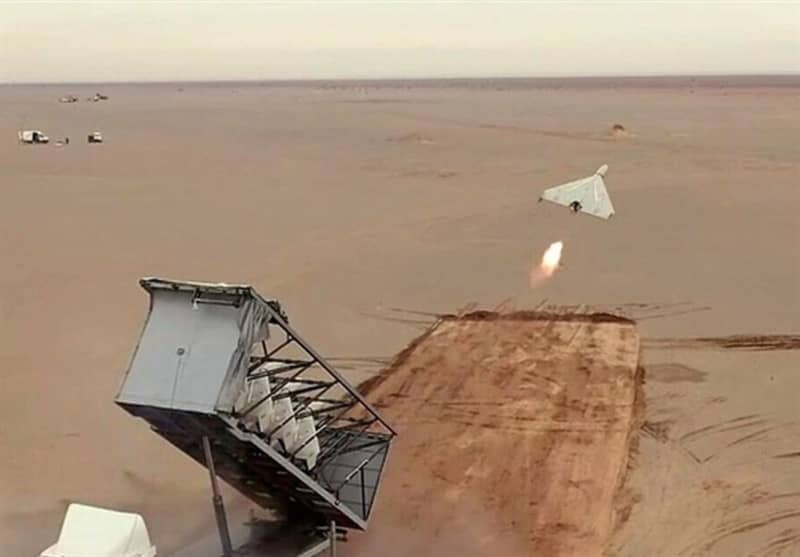Allies urge restraint as Israel mulls response to Iran attack

- Oops!Something went wrong.Please try again later.
- Oops!Something went wrong.Please try again later.
Calls for restraint mounted on Israel on Monday following Iran's unprecedented attack on the country, amid fears that the confrontation could further inflame tensions in the Middle East and bring the two sworn enemies to the brink of war.
German Chancellor Olaf Scholz called on Israel to help de-escalate the situation, calling the country's largely successful deterrence of around 300 drones and missiles "a success that should maybe not be thrown away," during a visit to China.
"We will do everything in our power to prevent a flare-up, an escalation," French President Emmanuel Macron told broadcaster BFMTV.
Israel's war cabinet met for a second time in 24 hours on Monday and weighed several possible responses to the attack, according to a media report, but it remained initially unclear whether a decision was made.
Some of the options are minor in nature, while others are more intensive, Israeli television station Channel 12 reported, saying Israel seeks a response that is painful to Iran without sparking a regional war.
The cabinet, led by Prime Minister Benjamin Netanyahu, met for nearly three hours, assessing possible responses to the airstrikes, which came following a strike on Iran's embassy compound in Damascus believed to have been carried out by Israel in which several high-ranking commanders were killed.
Israeli Prime Minister Benjamin Netanyahu said at a private meeting with ministers from his Likud party that Iran's missile attack must be followed by a smart response, according to a report by Kan radio station.
Iran should have to wait nervously to see when the backlash will come, as Israel did before the attack late on Saturday evening, according to the report.
The broadcaster reported, citing a high-ranking official, that Israel has promised to inform the US before launching a counter-attack, in order to give US troops in the region time to prepare for any Iranian retaliation.
On Sunday, US President Joe Biden had urged Netanyahu to "think carefully and strategically about risks of escalation," according to a senior US government official.
Within the Israeli government, there are calls for swift and harsh action, particularly from politicians on the far-right wing. The hardliners are not represented in the war cabinet, however.
"The best thing to do in the case of Israel is to recognize this has been a failure for Iran," British Foreign Secretary David Cameron told Times Radio.
While Israel had the right to respond to such an attack, he said Britain also wanted to avoid escalation and was urging the country to "think with head as well as heart."
Western leaders also directed warnings at Tehran.
Iran's first ever direct attack on Israel was a "terrible escalation" that should not have taken place, Germany's Scholz said.
The German Foreign Office summoned Iran's ambassador in response to the overnight attack, a spokesman said. Tehran had also summoned the German ambassador on Sunday, along with those of France and Britain, citing the countries' "irresponsible positions."
Even Russia, which is being supplied by Tehran with combat drones used in its war on Ukraine, called on Israel and Iran to exercise restraint.
The Secretary of the Russian Security Council, Nikolai Patrushev, emphasized in talks with the head of the Israeli National Security Council, Zachi Ha-Negbi, "the need for restraint on all sides of the conflict in the Middle East in order to prevent its escalation," Russian state agencies reported.
Iranian Foreign Minister Hussein Amirabdollahian, meanwhile, described his country's attack on Israel as a matter of "legitimate defence" in talks with several of his counterparts.
In a call with EU foreign policy chief Josep Borrell, Amirabdollahian once again criticized the April 1 attack on Iran's embassy compound in Syria that left seven people dead, including two top commanders. Israel has not denied responsibility for the airstrike.
Amirabdollahian said Iran "had no choice but to punish the Zionist regime as part of its legitimate defence," a statement from his ministry said.
According to his ministry, Amirabdollahian has also spoken to the foreign ministers of Saudi Arabia, Syria, India, Qatar, Egypt and Malta.
In a conversation with his Russian counterpart Sergei Lavrov, Iran's foreign minister warned of a harsh response if Israel retaliates.
Earlier on Monday, Israel's Home Front Command lifted restrictions, imposed on civilians while the country waited for the Iranian attack.
The order had banned educational activities and put limits on workplace and other public gatherings.
Exceptions continue to apply to high-risk areas, such as communities bordering the Gaza Strip and Lebanon. There, only up to 30 people are allowed to gather outside and up to 300 inside. Citizens must also ensure that they can quickly seek shelter in the event of an emergency.

